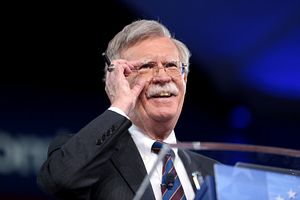On Thursday evening, U.S. President Donald Trump announced that Lt. Gen. H.R. McMaster would step down as his national security advisor. McMaster would be replaced by none other than John Bolton, the Bush administration’s former ambassador to the United Nations and undersecretary of state for arms control and international security. Bolton’s appointment comes the same week as the 15th anniversary of the start of the U.S. campaign to invade Iraq in 2003 and by a president who’d vocally criticized that war during his campaign for the presidency.
The Bolton appointment had been rumored for weeks; he was spotted meeting with Trump at the White House recently. Washington insider accounts appeared to confirm that McMaster’s fundamental incompatibilities with Trump had reached a tipping point lately. The administration is now poised to see a third national security adviser enter the White House. The change comes just shortly after Trump sacked Secretary of State Rex Tillerson, with CIA Director Mike Pompeo nominated to replace him.
The introduction of Bolton and Pompeo into these senior roles puts two proponents of brash American unilateralism into positions where they will likely exercise considerable influence over how Trump maneuvers on critical issues. Bolton, in particular, has espoused extreme views in recent years — even for the Trump administration — on the proper course of action on Iran and North Korea. Bolton is a fierce critic of the Joint Comprehensive Plan of Action (JCPOA) and a proponent of preventative war with North Korea.
With North Korea, Bolton has a history too. In 2003, on the cusp of multilateral talks about Pyongyang’s furtive uranium enrichment program after the collapse of the 1994 Agreed Framework, North Korea slammed Bolton for calling then-North Korean leader Kim Jong-il a “tyrannical dictator.” In response, North Korea called him a “bloodsucker” and “human scum” and refused to entertain him as an official member of any U.S. delegation, even as Bolton remained an undersecretary of state. Bolton also expressed glee when he learned of North Korea’s uranium enrichment efforts, which contravened the Agreed Framework, describing the development as presenting him with the “hammer I had been looking for to shatter the Agreed Framework.”
These details may seem like relics of the Bush administration at this point, but they serve to illustrate that Bolton is fundamentally not disposed toward diplomacy. Instead, he’s a hard power unilateralist, seeing no problem too large for U.S. military power. In this sense, Trump’s choice to appoint Bolton just two weeks after his acceptance of an invitation from Kim Jong-un for a historic U.S.-North Korea summit — the first of its kind — is odd. If the administration wants to show that it is interested in a good faith effort toward diplomacy, bringing John Bolton into the policymaking arena is not the way to do so.
Bolton’s views should also concern U.S. allies. His preference for unilateralism does not give U.S. allies any particular privilege. Writing in the Wall Street Journal last August, days after North Korea had tested its second Hwasong-14 intercontinental-range ballistic missiles, Bolton argued that “no foreign government, even a close ally, can veto an action to protect Americans from Kim Jong Un’s nuclear weapons.” His predisposition toward a first strike on North Korea — a comprehensive one too, that would seek to entirely disarm North Korea, going much further than any supposed “bloody nose” strike — could leave South Korea and Japan vulnerable to North Korean nuclear preemption. Both allies should be concerned that should diplomacy with North Korea ultimately fail, as may well be likely with Bolton whispering in Trump’s year, that a devastating nuclear war is not the automatic fallback.
Bolton will formally assume the role of national security advisor on April 9 and immediately become one of the most significant voices on foreign policy in the Trump administration. It remains to be seen the extent to which Bolton will retain his preference for hard-nosed unilateralism in this administration. Moreover, depending on how Bolton steers inter-agency debates, its easy to imagine his personality clashing with someone like Secretary of Defense Jim Mattis, who remains one of the rare influential voices in this administration cautioning against unilateral withdrawal from the JCPOA and conflict with North Korea. But with Bolton and Pompeo soon to be by his side, Trump’s worst and most violent instincts on foreign affairs may find their willing enablers.
































